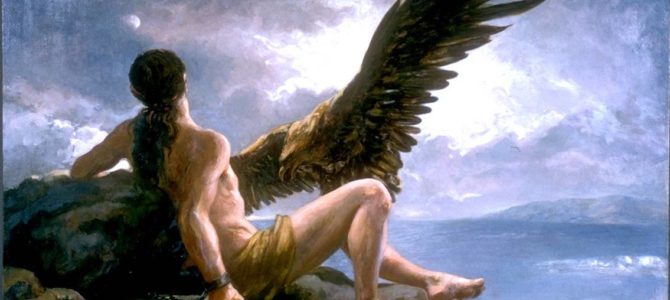
Recent political movements in America have taken on a Promethean character. Prometheus, the reader will recall (if literate in Greek Mythology), is the Titan who stole fire from the gods to give to humanity. For his theft of fire from Mount Olympus, Prometheus secured the contempt and harsh punishment of Zeus.
The myth of Prometheus show us what is at stake in our most recent violent demonstrations. The myth has much to tell us regarding the thinking at play between the Blood and Soil white nationalists of Richard Spencer, and Antifa in Charlottesville, Virginia. It was here that we witnessed two sides of the same fascist coin fight for, as Robert Tracinski notes, what type of totalitarianism will define our body politic.
The Myth of Prometheus
Prometheus has become a sort of saint among anti-theist crowds. Karl Marx viewed him with the same sort of affection he had for Lucifer. Prometheus’ speech to Zeus—“Know well I would never be willing to exchange my misfortune for that bondage of yours. For better do I deem it to be bound to this rock than to spend my life as Father Zeus’ faithful messenger”—was a prefix to Marx’s doctoral dissertation. This idea of smaller gods overthrowing the established order of greater gods in a revolutionary manner has been food for political thought for much of modernity. These anti-heroes, in Marx’s thought as well as in the thinking of other post-enlightenment thinkers, represent man’s highest act of freedom by stealing his inheritance from God.
With white nationalists and “anti-fascists,” both of whom carry the torch of Marx’s sociopolitical thought, the rules of engagement have been defined and agreed upon. Words and violence are interchangeable. Race wars are inevitable. The debate is not one of socialism or capitalism (and to what degree), but rather what strain of socialism. Rights must be stolen from the greater gods of government. And both maintain their marquee hostility toward Christian thought. Richard Spencer, with his Nietzschean subset of beliefs, sees Christian philosophy as a development for the fetishization of weakness. Antifa, relying on insufficient imagination (not to mention historical knowledge), sees Christianity as yet another vehicle for white supremacy. In both examples, we know there has always been a direct link in the relationship between these anti-Christian movements and fascism.
The story of postmodernism in the West is one of a conflict of values between enlightenment philosophy and Christian theology. The struggle seemed to reach a point of harmony with the culmination of the American experiment here in the United States. The framers set up the rules in a way that would reflect more heavily on Enlightenment values, but the body politic would self-govern through their Christian beliefs. A limited government for all has been the only sure method of maintaining harmony in a pluralistic society. This has successfully been achieved only when, as Rusty Reno notes, Christians are the leaven of their communities. But as time marches on, and the beliefs of our forefathers are launched into the dustbin of history, the tension between the two worldviews has begun to show signs of irreconcilability.
Thomas Merton And The West
The challenges of the modern West were not lost on the thinking of Thomas Merton, the Trappist monk and activist writer, who wrote extensively on the topic of Prometheus and the modern world. For Merton, understanding this myth was something akin to a Rorschach test of what freedom actually means. Its definition has been a great point of tension between Enlightenment philosophers and generations of Christian thinkers, but one point seemed conclusive to Merton—if you believe in gods in man’s image, like Zeus, then theft may be your only option.
Pagan mythology is a collection of stories that represent the human ego. It is framed on gods who are as vicious and small-minded as people are wont to be. The gods steal from mankind, exhibit the heights of depravity in their lusts, lord their good fortune over humans, and dole out punishment if for no other reason than mere pleasure. All the while, they bask in the glow of immortality.
Mankind should be jealous and vengeful towards such hostile creatures. This is where many Enlightenment philosophers, Marx included, are justified in sanctifying Prometheus. He is the proper anti-hero who marches up Mount Olympus and steals from these wicked gods the fire that is rightfully his.
They are wrong, though, in applying this myopic caricature to the God of the Christians. As Merton has written, “How sad is the figure of Prometheus and how sad are his gods: for they had to fear him in order to exist and he had to hate them in order to live.” An iconoclastic act against such small-minded gods is necessary to overthrow this balance of power and to level the playing field. Merton continues, “Without the living God, without a center, men become little helpless gods, imprisoned within the four walls of their own weakness and fear.” This is the crux of the problem of freedom in Merton’s view: should one storm the heavens and demand his inheritance, or accept in grace the freedom of which he was endowed?
Finding True Freedom
This is also the crux of the problem with ideologies that narrowly define freedom as something that must be plundered. Paradoxically, as we have seen in modern history, such views of freedom inevitably invite the worst kinds of oppression. Since they require a Promethean-like figure, in his finite limitations, to overthrow the natural order, they will always be tenuous.
In the end, and against the wishes of some of our brightest philosophers, there is only one type of freedom available—and it is achieved through Calvary. It was the will of the God of Creation to give man dominion over the fruits of His labor; in return, man attempted, in a Promethean act, to “raise himself by his own bootstraps to the level of the gods” (to borrow a phrase from the theologian Hans Urs Von Balthaser). Then in an act of Infinite Grace, God reconciled man to Himself by sending His Son to pay the penalty for man’s sin.
Through Christ’s self-emptying love for mankind, manifest on the cross, we are presented access to the only true freedom. In this act, Christ offers an image of God who wishes, through grace, to give us this flame that our finite minds cannot imagine would freely be given. Thomas Merton rightfully saw in the myth of Prometheus a struggle against the worst gods of human impulse—gods that will invariably discover the fate of Prometheus by being chained to a rock and eaten alive.
Political movements like those on display in Charlottesville must grapple with Prometheus’ fate. No matter what stripe of anti-theistic or anti-human zeal, when rights must be taken rather than endowed, then the gods of our very own image will ensure we get our just desserts. Or in the words of Prometheus himself, “Implacable is the heart of Zeus, and harsh is every king whose power is new.”









